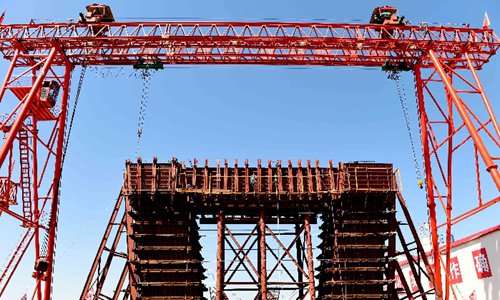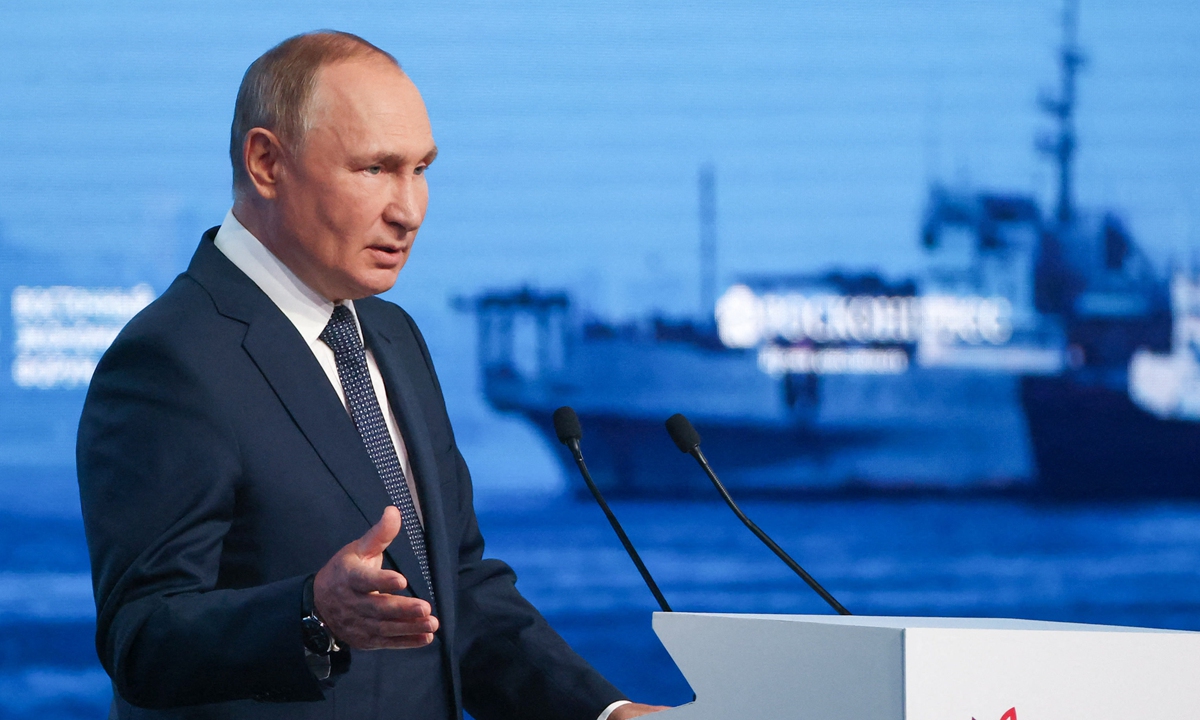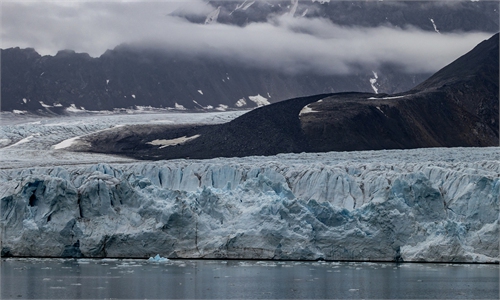China, Russia to strengthen cooperation on the way to a ‘multipolar world’
Western countries are hurting everyone, including their own people: Putin

Builders work at the construction site of Heihe-Blagoveshchensk road bridge at the border of China and Russia, June 21, 2017. Photo: Xinhua
China will strengthen cooperation with Russia and work together with other members of the international community to boost the multipolarization of the world, Chinese experts said, as the 7th Eastern Economic Forum (EEF) is being held in Vladivostok, Russia. Russia also harshly criticized Western sanctions against it over the Ukraine crisis as they have brought great damage to everyone around the world including their own people in the West.
Russian President Vladimir Putin said on Wednesday at the forum that "the West is failing, the future is in Asia." Western nations are hurting everyone, including their own people, in an attempt to preserve global dominance that is slipping from their hands, Putin noted.
He also said that efforts to isolate Russia were in vain amid a pivot toward Asia, media reported.
The unfolding global economic crisis was triggered by "Western elites, who would not, or even cannot, acknowledge objective facts" about global changes, the Russian president said. Leaders in the US and their allies are seeking to preserve "the world order that benefits only them, forcing everyone to live under the rules, which they invented and which they regularly break and constantly change depending on the situation," Putin remarked.
Facing opposition from nations that don't want to bend to their will, the US and its allies "lash out" and take shortsighted decisions that hurt not only the dissenters, but also their own nations, Putin stated, referring to a "growing detachment" of Western elites from the common people.
Li Zhanshu, chairman of the National People's Congress Standing Committee, attended the plenary session of the EEF on Wednesday.
Wang Yiwei, director of the Institute of International Affairs at the Renmin University of China, told the Global Times on Wednesday that under the huge impacts brought about by the sanctions and the major power competition strategy launched by the US and its Western allies, the necessity and importance of the China-Russia cooperation is rising, and the two countries will have to work together to safeguard and reform the international order, while the US is trying to break and reshape one to serve its hegemony.
A Beijing-based expert on international relations who asked for anonymity said the US is unhappy with the current international order and globalization, as Washington's elites believe that the current order benefits only the rising powers, especially China, while weakening US' hegemony, so it's using regional problems like the Ukraine crisis and Taiwan Straits tension to mobilize its allies to serve US' strategy of containing China and Russia, but it has underestimate the resilience and strength of its competitors.
"More importantly, it has ignored the damage to the people around the globe, such as the terrible energy and food crisis, so this makes more and more countries realize the danger, uncertainty and risk of a US-dominated order, or a polarized world. And that's why the EEF's theme this year is 'on the way to a multipolar world. This has reflected a consensus shared by more and more countries worldwide," the anonymous expert noted.

Russian President Vladimir Putin addresses the Eastern Economic Forum held in Vladivostok on September 7, 2022. Photo: AFP
De-dollarization, multi-polarization
Putin said Russia is abandoning the use of the US dollar and British pound, as the US has undermined the foundation of world economic system and the two currencies have thus lost credibility.
Russian natural gas producer Gazprom and Chinese oil major CNPC will shift to payments in rubles and yuan for gas supplies to China, TASS reported on Tuesday.
Myanmar also announced on Wednesday that it is purchasing Russian oil products in rubles.
Experts said the move by Russian and Chinese energy companies, when fully implemented, will remove a large chunk of international energy trade away from the dollar-based international payment system.
Also, the current environment, with the Group of Seven (G7) countries trying to cap the price of Russian oil exports and a temporary shift in global energy mix toward to fossil fuels, China's imports of Russian energy is set to see further growth, Jin Lei, an associate professor with China University of Petroleum, told the Global Times on Wednesday.
Highly successful cooperation
China is the top investor and biggest trading partner for the Russian Far East. In 2021, trade with the region grew by 28 percent to $14 billion, and 54 Chinese-invested projects with a total investment of $14.7 billion were used in infrastructure, energy, agriculture or sectors related to the Arctic shipping route.
Alex Cao, a Chinese entrepreneur participating in the forum, said the EEF brings together the heads of almost all big Russian firms and is an important platform for his company to develop business ties with.
On account of the increased financial cooperation between China and Russia under the current environment, he intends to seek to ink a number of financial agreements with Russian banks to fuel the development of his company, which is in the agriculture sector, Cao said.
Bilateral financial cooperation has seen progress in recent months as the use of Chinese yuan continues to expand in Russia. Big Russian companies including Russia's largest gold miner PJSC Polyus and Russian aluminum company Rusal have issued yuan-denominated bonds in the Russian market as Russian market players explore the yuan as an alternative to the US dollar and the euro.
China's trade with Russia has surging 31.4 percent year-on-year from January to August to $117.2 billion in the dollar terms, data from China's General Administration of Customs showed on Wednesday. China's imports from Russia surged by 50.7 percent to reach $72.95 billion during the period.
Russian Economic Development Minister Maxim Reshetnikov told reporters on the sidelines of the EEFthat trade between the two countries is expected to reach an all-time high of $170 billion by the end of the year, on track to meet stated goal of increasing trade turnover to $200 billion by 2024.
The Russian minister added that these figures are confirmation of the joint work between Russia and China in many areas, including resolving export-import problems and ensuring the uninterrupted supply of goods and the unhindered movement of goods through border checkpoints, despite the current COVID restrictions.
Sun Zhenbo, a manager with Erenhot Haotian Agriculture Co in Erenhot, North China's Inner Mongolia Autonomous Region, said the pandemic has posed unprecedented difficulties to cross-border trade of grains.
Many traders have abandoned the overland railway trade route due to uncertainty in the current environment, and as a result, the residential population of the small border city has declined by one quarter, Sun said.
RT reported on Wednesday that sanction pressure by some Western countries is spurring heightened demand for industrial capacity and said this could a major opportunity for cooperation with China, citing a business lobby.
The pressure by Western sanctions has forced Russia to ramp up its efforts to launch new factories and enterprises, said Evgeny Markin, executive director of the Russian-Chinese Business Council .
Joint projects in the sphere of production of new plants and enterprises are among the most important areas, Markin told RT.
A Russian Foreign Ministry official told media outlets in Moscow on Wednesday that Russia and China are exploring 79 deals that could amount to a total sum of $ 160 billion.
The official said Russia welcomes investment from China, unlike the US, which treats such investment in a doubtful and hostile light.
The EEF has seen the inking of over 150 deals worth 1.53 trillion rubles. China fielded the largest delegation to the forum, with 205 representatives on site.



